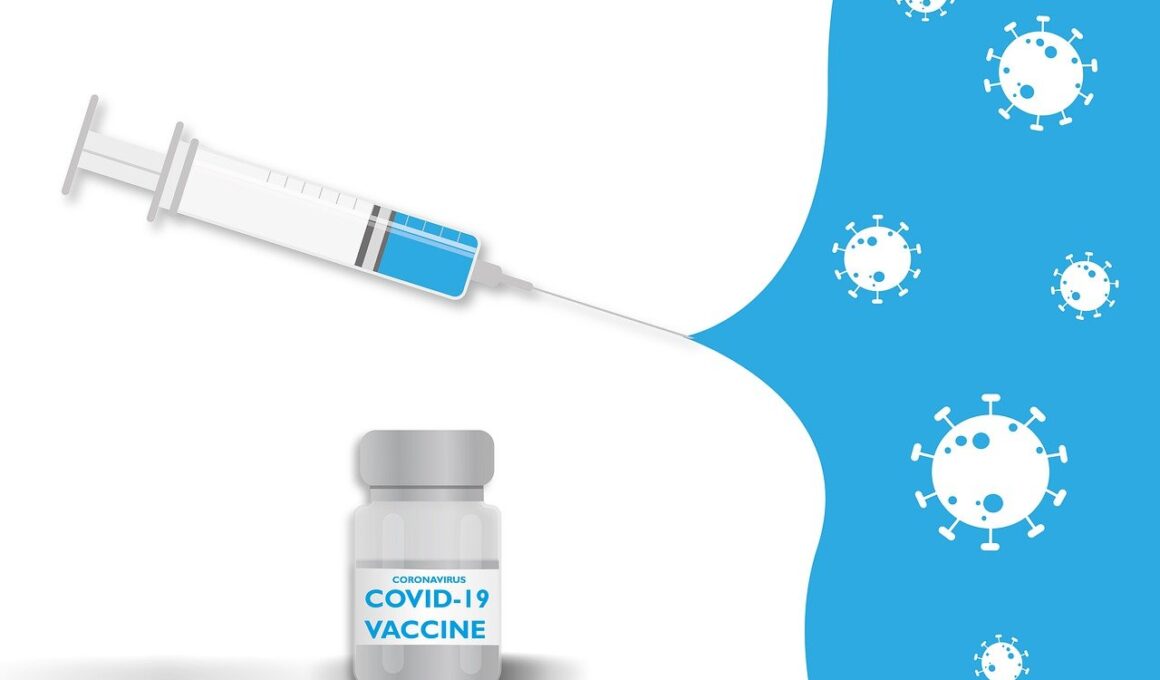How Vaccines Support Fitness in Individuals with Chronic Conditions
Vaccines are an essential aspect of preventative healthcare, particularly for individuals living with chronic conditions. Chronic diseases, such as diabetes and heart disease, can significantly impact a person’s overall health and fitness. Immunization helps bolster the immune system, which is particularly crucial for those managing long-term health issues. When individuals with pre-existing conditions contract infections, the consequences can be more severe than in healthier populations. For example, a common flu can lead to serious complications, making vaccination vital for these individuals. Alongside maintaining fitness routines, receiving vaccines reduces the risk of illness interruptions, enabling a more consistent engagement in physical activities. This engagement is essential for managing weight and anxiety, contributing to better health outcomes. Vaccination not only protects but also encourages people with chronic conditions to take their health into their own hands. With a more robust defense against infections, these individuals are more likely to stay active and maintain a healthy lifestyle. Therefore, vaccines are not just about preventing infectious diseases; they are also about empowering people to live their best lives despite their chronic conditions.
Chronic conditions come with unique challenges that can affect physical fitness levels. For instance, conditions that limit mobility, such as arthritis, might deter individuals from participating in regular exercise. However, vaccinations can mitigate the risk of debilitating infections that could further hinder mobility and disrupt fitness plans. When CDC recommends vaccines, it’s targeting vulnerable populations, ensuring that they remain healthy enough to cultivate regular fitness habits. Furthermore, research has shown a direct correlation between regular physical activity and enhanced immune responses to vaccinations. As a result, individuals with chronic health issues, when vaccinated, are more capable of engaging in physical exertion that promotes overall health. Incorporating light physical activity, even post-vaccination, can lead to significant health benefits, such as lowering blood pressure and improving circulation. Additionally, feeling secure through vaccination can boost confidence in exercise regimes, allowing individuals to work on both their fitness and chronic disease management. Fitness experts often highlight the synergy between an active lifestyle and good vaccination records as a powerful combination for improved quality of life.
Impact of Vaccinations on Chronic Disease Management
Vaccinations play a critical role in the management of chronic diseases. Influenza and pneumonia, for instance, can pose heightened risks to those with chronic illnesses, exacerbating symptoms or leading to hospitalizations. Receiving vaccines significantly decreases these risks, allowing individuals to maintain their fitness and health regimens. Additionally, steady attendance at fitness programs can be crucial to sustaining physical health, and vaccinations help individuals attend these sessions without fear of illness. Studies have indicated that fitness enthusiasts with chronic conditions who receive their vaccinations are more likely to adhere to workout routines, ensuring that they remain active. Staying active is indispensable for managing chronic conditions. It helps regulate weight, improves cardiovascular health, and enhances mental well-being. Vaccinated individuals can avoid barriers to fitness posed by illness, focusing instead on enhancing their overall health through movement. Therefore, the integration of vaccinations into healthcare plans for individuals with chronic conditions is paramount. By safeguarding their health, vaccines create a supportive environment for chronic disease management, facilitating a more enjoyable and sustainable fitness journey.
Moreover, fitness professionals advocate for the importance of vaccinations as a proactive approach in health management. Regular vaccinations empower individuals with chronic diseases to participate in fitness activities while minimizing health risks. This is particularly important during seasons when infectious diseases spike. For those who may already be dealing with the complications of managing chronic health issues, avoiding additional health strains is a priority. Vaccines contribute to overall health resilience and improved capacities for exercise. With adequate protection against infections, individuals are motivated to explore new fitness opportunities, such as group classes, outdoor activities, or community sports, which also support social engagement. Engaging with others in fitness activities can further enhance motivation and adherence to exercise regimens. In environments that promote fitness, the importance of vaccines becomes even more relevant. They empower individuals to connect with others, creating camaraderie and support as they navigate their health journeys. Therefore, vaccination knowledge should be an integral part of fitness and health discussions for individuals dealing with chronic conditions challenge, promoting a holistic approach to their well-being.
Building Community Awareness
Community awareness on the importance of vaccinations for those with chronic health issues is vital. Oftentimes, misconceptions surrounding vaccinations can lead to hesitancy, which might be detrimental for vulnerable individuals. Education campaigns aimed at informing about the benefits of vaccinations play a crucial role in dispelling these myths. Encouraging community members contributes to building resilience. In fitness group settings, leaders can take the initiative to talk about vaccinations openly, illustrating real-world examples of how they benefit individuals with chronic conditions. Community fitness events can incorporate educational materials about vaccinations alongside physical activities, creating an all-encompassing health experience. Regular workshops that invite healthcare professionals to speak about vaccinations and chronic disease management can also improve understanding and uptake. Moreover, these workshops can provide a safe space for individuals to voice their concerns, receive answers, and demystify the vaccination process. Increased understanding can lead to higher vaccination rates within communities, thereby protecting not just individuals but entire populations at risk. Overall, fostering a culture of vaccination is essential to fortify chronic disease recovery through fitness.
In addition, social media can be a powerful tool for enhancing community awareness of vaccination benefits for chronic condition management. Platforms enable health practitioners to share information, graphics, and personal stories about the impact of vaccines. Individuals with chronic conditions can relate to others in similar situations and might find encouragement from shared experiences. Fitness influencers can also use their platforms to promote vaccination as a critical element of an active lifestyle. Sharing testimonials of how vaccination improved physical health outcomes for individuals can create a positive ripple effect within communities. Of course, careful attention should be paid to ensure that the information shared is accurate and aligns with guidelines set by health organizations. Advocating healthy habits alongside vaccination can inspire others to view their health through a broader lens, appreciating the interconnectedness of fitness and vaccination. As communities grow in awareness, vaccination becomes more normalized, fostering environments that encourage proactive health management. Ultimately, through consistent dialogue surrounding vaccinations, individuals can strengthen their commitment to fitness as they manage their chronic conditions.
Conclusion
In conclusion, vaccines represent a crucial component for optimal health in individuals with chronic conditions who prioritize fitness. Immunization enhances health security, enabling a more active lifestyle while actively managing chronic diseases. Regular vaccinations ideally minimize preventable illnesses, allowing individuals to continuously engage in fitness and exercise. Furthermore, improved physical health can lead to positive emotional and mental well-being, cultivating a healthier life experience overall. Emphasizing the significance of vaccinations in chronic disease management not only serves to protect individuals’ health but also promotes a more vibrant engagement in fitness communities. As healthcare providers and fitness professionals collaborate to encourage vaccinations in conjunction with active living, they ultimately foster an environment that champions health resilience. The connection between vaccinations and fitness is a multifaceted one, driving home that overall wellness is achievable despite chronic challenges. Lastly, empowering individuals through education, community activism, and shared stories can create lasting societal change, leading to healthier generations. Hence, individuals with chronic conditions can thrive, enjoying the quest for fitness and improved quality of life through routine vaccinations.
Vaccines not only play a protective role but also pave the way for individuals expressing a renewed sense of agency over their health journeys. Acknowledging the benefits of vaccinations for fitness holds ground for sustainable health behaviors. Those living with chronic conditions who understand the interplay between vaccines and fitness can make informed decisions, thus enhancing their proactive health management approach. By promoting adherence to vaccinations, we are fostering an environment filled with empowered individuals ready to live their healthiest lives possible, even amidst chronic challenges.





